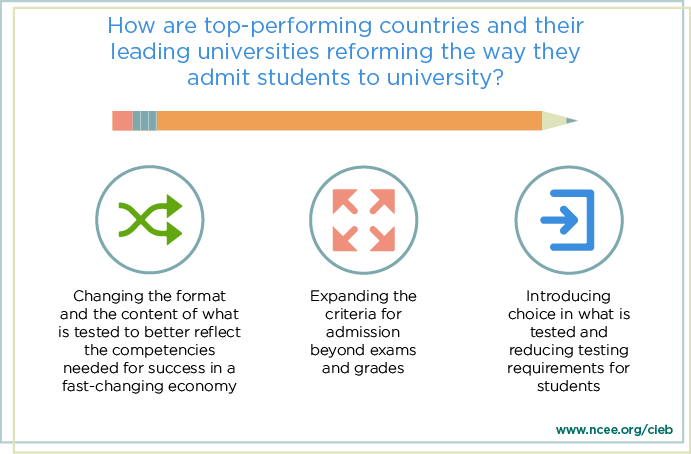
The College Board’s announcement last week that it will drop the optional essay and subject tests from the Scholastic Aptitude Test (SAT) was just the latest in a series of announcements that suggest major changes in how students in the U.S. will apply to college. Even before the pandemic prevented many students from taking the SAT and the American College Testing (ACT) college entrance exams over the last year, many higher education institutions, and even state systems—like California—had announced that these exams are optional for students. The U.S. is not alone in rethinking university admission. Top-performing countries and their leading universities are also reforming the way they admit students to university:
Changing the format and the content of what is tested to better reflect the competencies needed for success in a fast-changing economy: Shanghai is adding interdisciplinary essay questions to its gaokao university admissions test as well as an additional “non-traditional” section that a student can choose and which can be a practical test or project. Shanghai’s reforms are a pilot for the rest of China.
Expanding the criteria for admission beyond exams and grades: British Columbia has no provincial university admissions exam and students are typically admitted based on the GPA in a specific set of “university prep” high school courses. In 2019, the University of British Columbia, the flagship university in the province, announced a new “holistic” approach to admissions which includes looking at the entirety of the high school transcript to assess if the candidate has “excelled, challenged themselves, and has done well in course relevant to their chosen course of study” in addition to adding a personal profile that will be assessed for leadership, engagement and accomplishment, and the ability to communicate.
Introducing choice in what is tested and reducing testing requirements for students: Taiwan’s General Scholastic Ability Test (GSAT) used to have five required subjects and report the composite score to universities; in 2019, this was changed to allow students to take only the tests related to the area they were pursuing, which meant that they could drop two, or even three, of the five tests if not required by the departments they were applying to.




